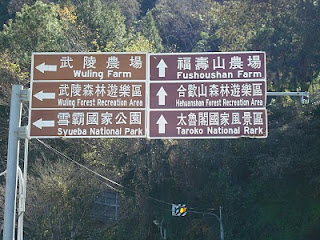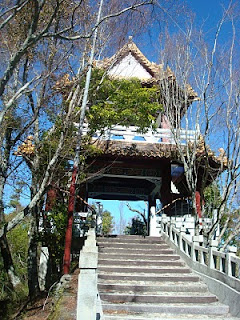at the intersection of highways 7 and 8 near Lishan
2. Once you make it up to Lishan it is kind of hard to get around. There are no regular cabs or buses around Lishan, but I was able to walk and hitchhike to a few nearby tea farms. I wanted to go to He Huan Shan (合歡山) but I decided to stay within 5 kilometers of town. I'll have to come back someday with my own car or scooter.
3. There is not a lot of tea being grown within 5 kilometers of Lishan town. I went to Fushoushan farm (福壽山農場) and did find a handful of other tea farms during my alpine hikes but for the most part I'd say Lishan is surrounded by fruit, fruit, fruit, cabbages, and fruit. I probably found only one tea garden for every twenty orchards!
4. With an elevation of around 1900 to 2200 meters, Lishan and the surrounding area can get really cold. I was lucky to have brought enough layers but I was shivering in the morning as I hiked along the frosty trails. The afternoon sun was glorious but it faded quickly.
icy!
5. Mid-January is not a great time to hunt for high mountain tea up in Lishan. According to my new friends at the Ming Gang Tea Garden (明岡茶園), Lishan has only three production seasons per year, which they described as: Spring Tea (春茶) around May, Second Season Tea (二季茶) around August, and Winter Tea (冬茶) around October or November. By mid-December most of the good tea has already been bought up.
healthy Lishan tea bushes on January 19, 2010
6. Lishan tea is expensive. I learned this from all of the working class people I hung out with up on the mountain. When I told them that I loved Lishan's high mountain tea and that it is what had inspired me to visit their part of the world, most would reply "the tea up here is too expensive... one jin (600 grams) usually costs between 3000 and 6000 NT$!" Maybe I'd have had better luck if I'd been there during actual tea production but my mid-January explorations only served to confirm their rants.
7. The folks at the town's visitor center are so kind and welcoming and they will even hook you up with some amazing tea to sip while you chat.
one cup of love poured from a steel thermos
into this cute little mug
into this cute little mug
8. Besides tea and fruit, Lishan has a lot of other cool stuff to see. Such as...
... a scenic pagoda ...
... a talented painting tire man ...
9. Lishan's fruit lives up to the hype! I had a few big, plump, juicy asian pears and a gooey, sweet tomato-passionfruit from the fruit vendors around Lishan and Fushoushan farm.
roadside fruit vendors
10. Lishan is absolutely gorgeous. I'm so glad I made it up to this beautiful alpine area. I greatly enjoyed my windy, sunny hikes among the pear orchards and seeing the many dramatic (sometimes snowy) peaks that surrounded this welcoming little town. I look forward to going back (but I may wait until the highway is fixed).
*I usually use the Pinyin system to spell Chinese words, but for this post I used the Taiwanese spellings when they differed.


















3 comments:
Wonderful blog post, Brett. Your photos and words make me feel like I was there with you! :)
BTW, I wrote a recent post on my own small blog that featured my two favorite tea experts in Seattle -- one of whom is you! Let me know if I got any information wrong, okay?
Cindy Wambeam
http://www.meltingteapot.com
You mention locals' comments on the elevated price of li shan teas. Curious to know how much price of lishan increased as a result of overall harm to the Taiwan tea industry?
Cindy - Thanks so much! You are too kind.
Jason - Great question man. It's likely that some Taiwanese tea firms have crunched those numbers but I imagine it can get very technical.
Post a Comment